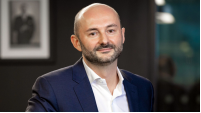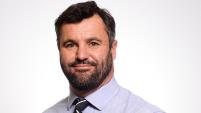Shipbroking majors have been faced with considerable challenges brought about by the Ukraine war, having to avoid transactions that could ultimately be connected to sanctioned trades. At the same time, shipping markets and vessel asset prices have proved volatile, as both vessel supply and the shipping markets have become increasingly affected by geopolitics
01 / Andi Case, Clarksons
Headed up by the inimitable Andi Case since 2008, the London-listed shipbroker and maritime services group Clarksons reported record pre-tax profits in the first half of 2023 of £52.2m ($66.4m), which was a 24.2% increase over the corresponding period of 2022.
Around 80% of its 1H 2023 revenue of £321.2m was provided by its broking division. While this remains the most profitable and highest-earning division, by far the world’s largest shipbroking company has other income streams that are complementary to its broking division.
Clarksons’ services business, which includes ships agency and freight-forwarding division Clarkson Port Services, provided 8.5% of revenues in 1H 2023.
This was followed by its financial business (8.3%) and Clarkson Research Services, which provides data and analysis to many maritime industry stakeholders, which provided 3.2% of revenue.
Its finance, research and expanding green transition divisions provide and support investment banking and decarbonisation advisory services, while the company continues to invest in its Software as a Service business to enhance software, digital products and services for its maritime clients.
Clarksons is one of the few shipbroking businesses that is involved across all shipping markets. It has benefited from strengthening gas, offshore, tanker and vehicle carrier charter rates as the dry cargo and container sectors have softened from their highs seen in 2021 and 2022.
Supported by the strong shipbuilder connections of chief executive Case, Clarksons is the world’s largest broker of newbuildings.
The 166-year-old business employs some 1,800 staff in 24 countries, with around 1,300 being employed in the shipbroking division.
Earlier in 2023, Clarksons’ UK-focused Port Services business was expanded by the acquisition of Netherlands-based DHSS, which provides services for the North Sea offshore wind farm sector.

02 / James Gundy, Braemar
London’s other listed shipping services business, Braemar, employs 400 personnel globally, with circa 240 deployed as shipbrokers.
Braemar told Lloyd’s List that it recorded “substantial” growth in its US markets in 2023, with reasonable growth in Europe, while its Asia-Pacific and UK operations reported revenues that were slightly down compared with 2022.
In June 2023, it suspended its shares because of an investigation into an unspecified transaction of $3m, which originated in 2013, and involved payments being made through to 2017.
The James Gundy-led company said 38% of revenue in 2023 was provided by its tanker broking desk. This was followed by dry cargo with 23%, and sale and purchase providing 21%.
Its securities and offshore divisions provided 11% and 4% of revenues respectively, while corporate finance made up the remainder.
In 2023, Braemar acquired US-based Southport tanker brokers and the tanker desk of Spanish shipbroker Medco. In addition, it set up a new corporate finance desk in Greece and appointed SSY’s former head of research Derek Langston to run dry cargo research.
The company reported a doubling of operating profit, excluding foreign exchange movements, for 2023 of £20.1m with full-year revenue of £152.9m, up from $101.3m for full-year 2022.

03 / Stanko Jekov, SSY
SSY, recently rebranded from Simpson Spence & Young, is one of the world’s largest independent shipbrokers and deploys 400 personnel in 21 offices worldwide.
The company, founded in 1880, is headed by Stanko Jekov who took over from Mark Richardson in January.
Its SSY Futures division reported another excellent set of 2022 financial results due to disruption in global trade caused by the Ukraine war.
SSY Futures benefited from the consequent volatility in commodity prices and reported an increase in turnover from £13m in 2021 to £15.5m for the 2022 financial year, while profits of £4.1m were reported — slightly down from the £4.3m reported in 2021.
SSY’s shipbroking division reported a significant increase in turnover for 2022, from £5.6m in the previous year to £9.8m. It reported a profit for the 2022 financial year of £3m compared with £1.1m in 2021.

04 / Anders Hald, Maersk Broker
Privately owned by Denmark’s Moller family since its foundation in 1914, Maersk Broker remains one of the world’s most important shipbrokers in the containership charter market and is a significant player in the sale and purchase, and newbuilding sectors for various vessel types.
In recent years, the Copenhagen-headquartered company, led by chief executive Anders Hald, has expanded its chartering activities within the dry cargo sector, while the liquefied natural gas sector is generating an increasing share of revenue.
Maersk Broker told Lloyd’s List that its primary strategy is to expand its market share in sale and purchase, as well as newbuildings, and to further grow its relatively nascent LNG chartering business.
Both asset markets and LNG have positively impacted the company in 2023; however, it notes that charter markets in the dry cargo and containership sectors have both been “somewhat challenging”.
More positively, the offshore and offshore wind sectors have started to show growth.
The company has offices located in all the major shipping hubs, with Asia providing the best growth, staffed by a total of 250 brokers and supporting personnel.
Maersk Broker is well known for its research and analysis reports, alternative financing and vessel valuations services. Other areas for which Maersk Broker is active include supporting its clients for the long road to decarbonisation.

05 / Bjorn Andersen and Giovanni Ravano, Ifchor Galbraiths
The merger of the UK’s tanker shipping broker Galbraiths and Switzerland-based dry cargo specialist Ifchor in late 2022 delivered several tangible benefits for the combined organisation, not least by enhancing its international standing as it became one of the world’s largest shipbroking businesses.
Following the merger, IG has diversified into the offshore sector after the purchase of Norway’s UNO Offshore.
In addition, it has been engaged in building and implementing commercial decarbonisation strategies for its clients. These include regulatory advisory support and carbon emissions trading via its affiliate companies IG ClearBlue Oceans and Maritime Carbon Solutions.
Ifchor Galbraiths, led by co-chief executives Manu Ravano from Ifchor and Galbraith’s Bjorn Andersen, employs some 210 brokers in 21 offices worldwide and has benefited from favourable market conditions in the tanker trades and a strong sale and purchase market.
While the dry cargo sector has undergone a slump this year the company claims to have increased fixture transactions by almost 20% since the merger as it has sought to increase its market share across its main markets.

06 / Gilbert Walter and François Cadiou, BRS Group
For BRS Shipbrokers, a company with more than 150 years of presence in the shipping industry, new leadership means 2023 has been one of transformation.
Gilbert Walter, a BRS International board member, managing director of BRS’s Geneva office and a newbuilding shipbroker, was assigned as chief executive at the end of 2022.
Walter replaced François Cadiou, who remains as chairman of Luxembourg-based holding company BRS International, which owns the shipbroking company as well as shipping market data provider AXSMarine.
BRS Shipbrokers has more than 420 employees, which includes 250 brokers spread across 23 offices worldwide.
In the 1990s, BRS underwent significant change and evolved from a local family-owned business into an international company with a global reach.
Today, its offices are actively established in maritime hubs around the world. One of the core values of BRS Shipbrokers is the great proximity to clients that enhances the quality of their relationships and exponentially increases the flow of market information.
Some 40% of BRS’s shipbroking revenue comes from dry cargo business, while around 30% comes from tankers. Its offshore and renewables department, liner shipping, specialised tankers, gas and carbon businesses contribute 15%, while the remainder is provided by assets.
Recent businesses added to its services portfolio include carbon markets advisory, freight derivatives and ship finance consultancy.

07 / Guy Hindley and Henry Liddell, Howe Robinson Partners
Privately owned Howe Robinson reported to Lloyd’s List that it had a “strong result” for the financial year ending March 31, 2023 on the back of higher freight rates in the tanker sectors.
The company is active across the majority of vessel sectors, including the liquefied natural gas and ro-ro sectors.
The Singapore-headquartered company has 15 offices around the world. Its largest office is in London, with other major offices being Singapore, Shanghai, Delhi and Dubai.
Howe Robinson employs 340 people, of whom 233 are shipbrokers. It undertook more than 5,000 fixtures in the 2023 financial year.
Led by managing partners Guy Hindley and Henry Liddell, Howe Robinson is also known for its strong research capabilities in all of the sectors in which it operates.
Howe Robinson is wholly employee-owned and 180 of its employees are shareholders in the business.

08 / Roger Harrison, EA Gibson Shipbrokers
Energy shipping broker EA Gibson is one of the few big employee-owned shipbroking companies.
In the past year, it has been undergoing a strategy of modernisation, which included office moves in London, Singapore and Mumbai, together with the opening of new offices in Athens and Dubai.
Out of its 165 employees, some 100 are deployed as shipbrokers, who have benefited from strong — if volatile — freight rates across most of the tanker and gas shipping sectors.
At the same time, its brokers have had to navigate the increasing layers of complexity in oil, products and gas shipping due to the Ukraine crisis.
Gibson managing director Roger Harrison, who has headed the company since 2020, told Lloyd’s List that all markets in which the company operates have performed well, “both from a revenue generation and growth perspective”.
The company has been investing in developing propriety digital broking technology to further support its core businesses, said Harrison.
 09 / Christian and Walter Hinneberg, Walter J Hinneberg
09 / Christian and Walter Hinneberg, Walter J Hinneberg
Twin brothers Christian and Walter Hinneberg are the archetypal traditional shipbrokers.
Although certainly not a household name, such as Clarksons or Braemar and the like, the duo and their small team of brokers rely on tight-knit personal relationships with customers and an encyclopedic wealth of shipping knowledge.
Yet despite what Walter J Hinneberg — named after the twins’ late father, the company’s founder — lacks in size, it certainly holds weight in terms of its clientele.
The now more than 60-year-old business — operating out of central Hamburg, in the grand Ballindamm block overlooking the Alster Lake — has historical ties to nearly all sectors but today its forte is container shipping, in which it boasts some of the biggest industry names as regular customers.
Dealing chiefly in the secondhand and newbuilding markets, the brokerage is thought to have fared particularly well during the recent box shipping boom. And even as deals slow to a trickle in line with the market slowdown, this will not concern the Hinnebergs perhaps as much as others less well-versed in container shipping cycles.
However, when orders do begin to pick up once more, the brokers will be front and centre of negotiations, with numerous deals bearing the Hinneberg hallmark as they have in the decades before.
 10 / Dimitris Koukas, Optima Shipping Services
10 / Dimitris Koukas, Optima Shipping Services
Athens has grown rapidly in recent years as home to a large community of shipbrokers and the largest of these is Optima Shipping Services, headed by Dimitris Koukas. It has long offered a true one-stop shop to clients in competition with the major brokers overseas.
In 2023, Optima added a Singapore office to an existing network comprising the headquarters in Athens and well-established offices in Istanbul, Dubai and Shanghai.
A significant part of Optima’s clientele is outside Greece, although the bedrock of its business is acting for many Greek shipowners.
The past year has been one of Optima’s most active on record and the group has concluded well in excess of 200 sales and purchase transactions.
Its repairs division was on course to achieve 300 drydockings of vessels within 2023. The year has also been an active one for newbuilding contracting, with Greek owners increasing their interest in placing new orders. In addition, Optima claims a steady 5%-10% or so of worldwide demolition sales.
Optima is a pivotal entity in the Greek market, with a special interest in maritime tech. It has created Optima-X as a platform for supporting start-ups, and that has led to Enso XL, a maritime start-up accelerator.
At a personal level, Koukas is president of the Greek Shipping-Shipbroking Companies Association.
Source article lloydslist


